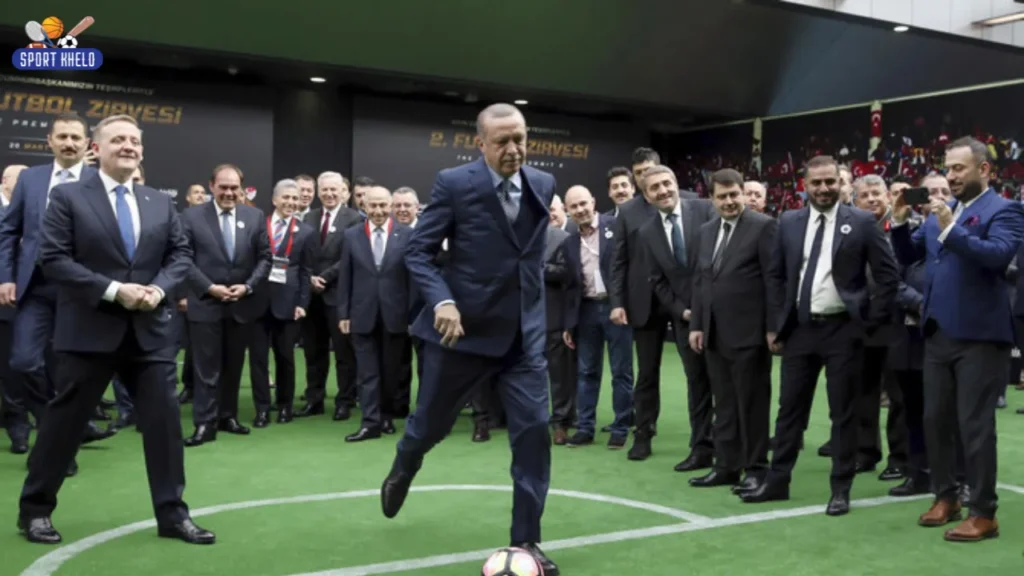Turkiye turns to quest for hosting football Euros after Champions League final
After a captivating Champions League final in Istanbul, where newly re-elected state President Recep Tayyip Erdoğan and UEFA leader Aleksander Čeferin shared a prominent presence, Turkey is poised to bolster its bid for hosting upcoming football tournaments. With two crucial votes scheduled for October 10, Turkey faces stiff competition from the joint U.K.-Ireland bid for Euro 2028 and a Euro 2032 duel with Italy.

However, the prevailing belief is that Turkey’s sights are set on the 2032 edition, given the perceived likelihood of the British and Irish securing the 2028 bid. As Turkey intensifies its campaign, the recent success of organizing large-scale events in the country and the impressive infrastructure developments under President Erdoğan’s leadership are poised to bolster its chances.
Also Read : Soccer : Frankfurt appoints Toppmoeller as new head coach
Turkey’s Persistent Pursuit
Turkey’s ambition to host major international football tournaments dates back to 2002 when the nation, in a joint bid with Greece, narrowly missed out on hosting Euro 2008. Since then, under the leadership of President Erdoğan, Turkey has endeavored to persuade UEFA of its immense hosting potential. With over 20 years of Erdoğan’s political tenure, including his active involvement in football-related activities, Turkey’s construction projects have become pivotal to the bid’s success. The nation’s population of 85 million, coupled with state-of-the-art stadiums built in recent years and substantial infrastructure investments, serve as compelling factors to support Turkey’s candidacy, according to Mehmet Büyükekşi, the President of the Turkey Football Federation.
Key Infrastructure Developments
Turkey’s bid showcases impressive infrastructure, including the acclaimed Istanbul Airport, which opened its doors in 2018 and ranks among the top ten airports globally in various metrics. Given the extensive geographical reach of the proposed host cities, such as Trabzon, which is over 1,000 kilometers (650 miles) east of Istanbul, efficient air travel becomes vital for teams and fans alike.
To ensure an exceptional spectator experience, the Atatürk Olympic Stadium, already renovated to accommodate close to 72,000 spectators, is set to undergo further upgrades. Additionally, the bid plan includes stadiums owned mostly by the state, with the iconic homes of Istanbul clubs Galatasaray and Fenerbahce playing a prominent role.
Advantages Over Rival Bids
Turkey’s bid gains an edge over its rivals by offering state-of-the-art stadiums that contrast with their competitors’ relatively older facilities. Büyükekşi highlights this advantage, stating that “A European Championship in Turkey can add great value to us, and we can contribute to European football.” While acknowledging the competition, Turkey remains committed to securing the hosting rights after narrowly missing out on Euro 2016, losing by a single vote to France. The loss served as a source of motivation, and Turkey is determined to persist in its pursuit of hosting a major international tournament.
Turkey’s Football Aspirations
Turkey’s history in international football tournaments includes impressive achievements, such as reaching the semifinals in Euro 2008 and the 2002 World Cup. However, the nation has not yet surpassed those heights. Hamit Altıntop, a former midfielder of the Turkish national team, believes that hosting a major tournament will inspire the next generation of players, fostering increased belief, faith, and self-confidence. The passionate Turkish players and fans, who deeply love the sport, are deemed deserving of the opportunity to witness and participate in such a momentous event.




